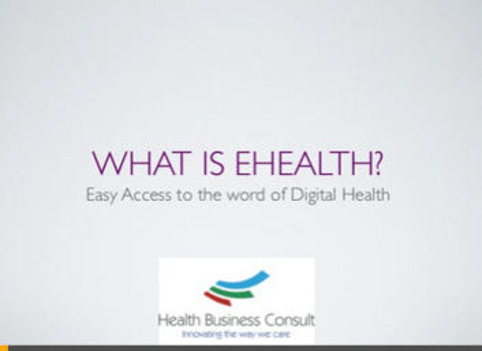eHealth – The Introduction.. See in a short overview what ehealth actually is and what steps you may take to apply it to your proper organization. Furthermore: learn about the ehealth thought…
Get Started for FREE
Sign up with Facebook Sign up with X
I don't have a Facebook or a X account

 Your new post is loading... Your new post is loading...
Implementing an eHealth initiative is the first step in moving your healthcare organization to the forefront of eHealth technology. For instance, how would your organization make use of this revolutionary eHealth initiative innovation? How would you react if patients began asking to connect their eHealth applications to your information system? eHealth initiatives require an analysis of your entire workflow from operations to systems and technology, from clinical and financial performance to implementation. eHealth initiative general outcomes expected include benefits to providers and to patients, rapidly expanding technological tools, and even more use of internet based activities. Working with The Fox Group’s eHealth experts through our three strategic eHealth Thought Lab meetings allows you to get customized knowledge on the processes and strategic changes that must be made in order to maximize the eHealth initiative potential within your organization. Each eHealth Thought Lab meeting will be tailored to your situation, and can jump-start your organization’s eHealth initiatives. By the end of this series of three strategic meetings, you will have an appreciation of the potential for your organization to embark on a meaningful eHealth initiative. [..] I. The Current eHealth Initiative: a short, to the point workshop introducing the main elements of the eHealth initiative, a working definition, the effectiveness and implications of eHealth in the future. You select the proper internal stakeholder audience of your organization.
II. eHealth Discussion and Analysis: a workshop reviewing your current eHealth applications, including electronic health record systems, mobile health, internet-based, social media interaction tools, telemedicine, and similar components. It will also address your organizational enthusiasm and/or challenges to creating a strategic planning process addressing the future in eHealth technologies as they unfold. Discussion between your representatives and experts from The Fox Group will run deep into several aspects of the eHealth initiative phenomenon.
III. eHealth Strategic Planning: a strategic workshop, where you discuss currently existing concepts, modules, and devices available to you and your patients. The final step is to identify the strategic actionable steps to implement your eHealth initiative, bridging the gap between what is available and what needs to be developed.
rob halkes's insight:
This is my and the Fox group's take on approaching ehealth. Yes it is promotional, but firmly based on experience and expertise. I thought one could do with the three step approach: update on what, discussing the impact for you and setting up a clear and effective plan to accomodate and develop your practice in health
The Dutch ehealth monitor of the Netherlands has been released recently. There is no English translation yet, nor a summary, but a English infographic is presented at this post on the website. Here you can see that ehealth is steadily but I guess, firmly growing in NL. More healthcare users say their GP allows them to make online appointments: from 7% in 2013 to 13% in 2014; or request repeart prescriptions: from 21% to 30%. More GP's, 93% to 98% (!) and medical specialists, 66% to 75% use mainly or exclusively electronic records! However no major shifts are found in the use of eHealth compared to 2013. There will be greater coordination in the area of eHealth. The Ministry of Health Welfare and Sport sets concrete objectives, and parties 'in the field' seek each other out for joint activities! Four things stood out in the study:
For a real, large scale use of eHealth a good balance is needed between the investment in money and effort and the experience added value in terms of imprived care, convenience and financial benefits. See here for Nictiz and here for Nivel the sources and down;oads of inforgroaphic (in English too) and the report (Dutch).
rob halkes's insight:
I would say that experience demonstrates that ehealth initiatives may be initiated by small efforts to digital services from physicians to patients, like repeat prescriptions. These are relatively easy first steps. I reckoned that on the basis of my own experience from early on. See some information to this here.
{…] The title of my talk was “Giving Up Control: Leading in the Digital Era”. One key data point from Gallup that continues to astound me is that worldwide only 13% of people are engaged in their work. It’s higher in the US, standing at 30% but that’s still terrible! I believe that a big reason for this is that we don’t give enough autonomy to, and respect the growing agency of our employees, especially for the Millennials who crave purpose and meaning in their work. The hierarchies that exist in our organizations were designed for a bygone era where efficiency and scale were paramount. But today, speed, innovation, and creativity are the sources of competitive advantage. Companies have been responding, deploying collaboration platforms and enterprise social networks to connect people throughout the organization. Shrinking the distance between previously siloed departments, or between executives and the front lines sounds great — unless you’re a middle manager. The biggest problem leaders face in the digital era is that power and influence are being decoupled from titles and organizational structure. So how can you be an effective leader? Here are the three things that organizations can do:
What each of these has in common is the need to give up control. In the talk, I shared the journey I’m going through as the parent of teenagers, as they push for greater autonomy and trust to make their own decisions. In our work, if we truly want to have an engaged workforce, then we’re going to have to lead differently, and establish a new kind of relationship and trust that’s created and deepened with these digital tools.
rob halkes's insight:
Working within the health care market I do witness daily the struglle of employers and employees, both within organizations of health care providers and of the industry to respons in a meaningful way to digital "disruption". Digital disruption has its potential to turn upside down every routine one uses tot get the job done, to approach customers/clients and to create value to business How to respond to forces that do have this 'threat'? Charlene discusses the leadership role. It goes further than that, but this is crucial. When leadership cannot acommodate, how sould the rest of the organization cope? This is certainly true for much of the pharma and devices companies, where leaders tend to hold on to market approaches that were successful in the days gone by. They should orientate themselves to new possibilities of customer approaches, not as an add on to what was done before, but to a new integrated system of engagement. Believe me, I could tell!
Live een congres volgen is dan wel erg 1.0, maar de deelnemers op het volgeboekte eHealth-congres twitterden zoveel dat #ehknmg op 9 februari landelijk een trending topic was. Het onderwerp leeft onder artsen. Digital doctoring is a hot issue in the Netherlands, twitter consults, on line therapy and digital are getting more popular each day. Health Insurance companies and health care delivery professionals join into these interests. President of the Dutch Doctors' associations, Arie van Nieuwenhuizen, opened the conference with the statement that "eHealth is now beyond being a hype." The conference agreed on the fact that eHealth still isn't that self evident part of common care. Structural reimbursement is relevant to that.
rob halkes's insight:
eHealth in NL beyond a hype. Great! See my short summary. There is a link to a videoreview. (All Dutch by the way ;-)) |














Discussions about health care reform might be supported by a clear view on eHealth and digital health. I guess this post describes it.